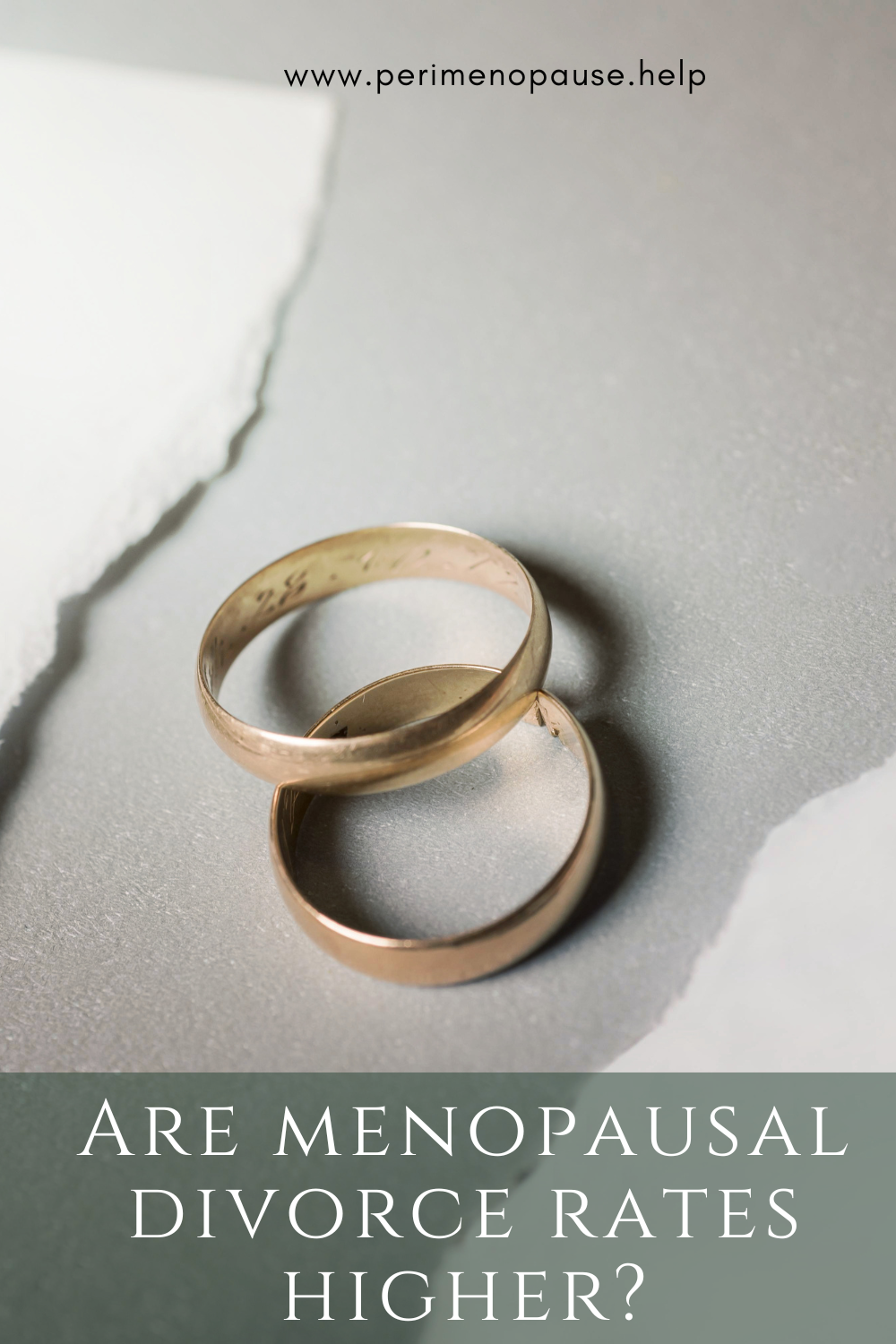Is the menopause divorce rate higher than pre-menopause? Learn the surprising link between menopause and divorce rates in this blog- and check out some tips to help you through this rocky time!

The connection between menopause and marital challenges has gained significant attention in recent years- the term menodivorce has even been coined. As women travel through this stage of life, many find themselves reassessing their relationships alongside their changing bodies, sense of self, and emotions.
The term “menodivorce” has emerged to describe the phenomenon of women ending their marriages during or after menopause. But what’s really behind this link, and more importantly, what can be done to support women and their relationships during this critical time?
Key Takeaways
- Menopause significantly impacts marital satisfaction, leading to higher divorce rates among women.
- Hormonal changes during menopause can cause emotional turmoil, prompting women to reassess their relationships.
- The term “menodivorce” reflects the growing trend of women leaving unsatisfactory marriages during menopause.
- Couples who undergo hormone replacement therapy together can reduce their divorce risk by over 50%.
- Seeking support and improving communication during menopause is essential for maintaining healthy relationships.
1. Understanding the Link Between Menopause and Divorce Rates
The correlation between menopause and divorce is more than anecdotal. Recent data shows that divorce rates among adults 50 and older have nearly doubled since the 1990s, with almost 1 in 4 divorces by 2019 involving older couples. This phenomenon, often called “grey divorce,” coincides with the typical age range when women experience menopause.
While menopause itself doesn’t actually cause divorce, the physical and emotional changes that accompany both menopause and the years leading up to menopause (aka perimenopause) can create new stressors in relationships. Some women find themselves more irritable or short-tempered, potentially from lack of sleep and the hormonal roller coaster they are experiencing. However, for many women, the menopausal years also bring clarity about what they want from the second half of their lives.
2. The Impact of Hormonal Changes on Relationships
Hormonal fluctuations during menopause can significantly affect mood, energy, and sexual desire. Estrogen and progesterone decline can trigger mood swings, insomnia, anxiety, and depression – all of which can strain even the strongest relationships.
Physical symptoms like hot flashes, night sweats, and vaginal dryness can disrupt sleep patterns and intimate connections. These changes don’t just affect women; partners often struggle to understand and adapt to these shifts.
To learn more about the symptoms of perimenopause, including the end stages where a woman is approaching twelve months without a period (menopause), check out this blog.
3. Personal Stories: Women Reassessing Their Marriages During Menopause
Many women report that menopause became a catalyst for deeper self-reflection. In my functional medicine practice I work with many women who are dealing with the symptoms of perimenopause and menopause, and many women express to me how these changes are affecting their relationships.
One patient put it like this: “The brain fog cleared, and I suddenly saw my marriage clearly for the first time. It wasn’t that my husband changed – I just finally acknowledged how unhappy I’d been for years.” Another told me, “During perimenopause, I hated my husband- he could do no right, I was so angry all the time” (in this situation, they did work through this, though, and hormone-balancing steps really helped her regain balance and control of the emotional ups and downs she was experiencing).
The awakening described in the first scenario is a common phenomenon. As hormonal changes reshape brain chemistry, many women describe feeling more assertive and less willing to compromise on their happiness. For some, this means working to improve their existing relationships; for others, it means moving on. And the second scenario is also quite common- and manageable too, by seeking out a support team that has experience working with women in perimenopause and menopause.
4. The Concept of “Menodivorce”
“Menodivorce” refers to the growing trend of women initiating divorce during or after menopause (or in the years leading up to the actual “day” of menopause- yep, menopause is truly just one day!). This phenomenon reflects how this life stage often marks the beginning of a completely new chapter in life for many women.
The ripple effects of “menodivorce” reach far beyond individual marriages. As more women in midlife begin prioritizing their own needs, fulfillment, and personal growth, our collective views on aging, marriage, and women’s roles are evolving. These shifts continue to challenge long-standing assumptions rooted in patriarchal traditions. Over time, as society moves further away from these outdated expectations, the impact of such transitions will likely diminish—just as we’ve already begun to see.
5. Statistics on Divorce Rates Among Older Women
The numbers tell a compelling story. While overall divorce rates have declined in recent years, divorces among older couples – the “silver splitters” is another term tossed around– continue to rise. Research indicates that women initiate approximately 70% of all divorces, with this percentage increasing among older age groups.
A particularly significant statistic from Newson Health Research shows that 73% of women blame menopause for their marriage breakdown.
Even more concerning, 67% report increased domestic arguments or abuse during this time. So that same clarity noted above can also serve as a turning point, helping women recognize patterns of mistreatment or imbalance they may have tolerated for years.
6. Common Symptoms of Menopause That Can Affect a Marriage
Several menopausal symptoms can directly impact relationship quality, and some are not as apparent as others:
- Mood swings and irritability that strain communication- this is one of the most common issues that affects relationships during the years leading up to menopause
- Sleep disruptions from night sweats affecting both partners- poor sleep can contribute to fatigue, mood swings, depression, anxiety, and so much more!
- Decreased libido and vaginal dryness making intimacy challenging; pair that with the potential hormonal decline that their midlife partner may be experiencing, and a marriage can be extra challenging.
- Weight gain affecting self-image and confidence
- Brain fog and memory loss creating frustration and misunderstandings
- Joint pain and a tendency to be more easily injured can impact exercise, fitness levels, and energy, potentially contributing to further mood shifts, weight gain, and reduced hours of sleep.
These physical and psychological changes can create a perfect storm for relationship discord, especially when there’s a lack of knowledge about what’s happening.
7. The Importance of Seeking Support During Menopause
Getting proper support during menopause is crucial for both personal wellbeing and relationship health. Unfortunately, many women report feeling dismissed by the medical community when seeking help for their symptoms.
Finding a menopause specialist or functional medicine doctor who understands women’s hormonal health can make a tremendous difference. These healthcare providers can offer personalized approaches to managing symptoms and improving quality of life during this transition.
8. How Couples Can Benefit from Hormone Replacement Therapy Together
One approach that has been helpful for some couples is both partners being treated by knowledgable practitioners either via hormone replacement therapy or even nutrition, lifestyle, and supplemental strategies.
This approach addresses not only the woman’s hormonal changes but also potential hormonal imbalances in male partners, such as declining testosterone that may contribute to erectile dysfunction.
When both partners address their hormonal health simultaneously, they often experience improved mood, sleep, energy, and sexual function – all contributing to greater relationship satisfaction.
9. Tips for Improving Communication During Menopause
Open, honest communication is essential in any relationship—but it becomes particularly crucial during perimenopause and menopause, when emotions, energy levels, and physical changes can significantly impact how partners connect and understand each other. These years can bring frustration, misunderstanding, or even distance—but with awareness and the right tools, they can also become a time to deepen emotional intimacy and teamwork.
Here are some strategies to help you communicate more effectively and compassionately during this stage:
1. Schedule regular “state of the union” check-ins.
Set aside intentional time—perhaps once a week—to talk about how you’re both feeling. Keep it neutral and non-reactive, and focus on listening rather than fixing. Choose a time when neither of you is tired, rushed, or distracted.
2. Use “I” statements to express emotions without blame.
Instead of saying, “You never listen to me,” try, “I feel unheard when I’m talking about how tired I am.” This approach reduces defensiveness and helps both partners feel more secure in opening up.
3. Learn together about menopause.
Education can turn confusion into compassion. Watch an educational video, listen to a helpful podcast, read an article, or attend a webinar together to understand how fluctuating hormones can affect mood, libido, sleep, and energy. When both partners know what’s happening biologically, empathy naturally increases.
4. Build a toolkit for emotional regulation.
Recognize when emotions are running high and take a short pause before responding. Practice grounding techniques—like deep breathing, short walks, or mindfulness—to reset before having sensitive conversations. Take a break when needed, and set a time to come back to the discussion when tensions cool down.
5. Share needs clearly instead of expecting mind reading.
Your partner can’t support you if they don’t know what you need. Be specific: “I need some quiet time when I get home before we talk,” or “It would mean a lot if you could handle dinner on nights I’m not feeling well.” And share emotions like “I feel hurt when you do this..”
6. Consider couples therapy or coaching.
A neutral third party can help both partners communicate more effectively, especially if you’re caught in repetitive patterns of misunderstanding or resentment. Many therapists now specialize in midlife transitions and can help you both express your feelings and gain clarity.
7. Practice patience and compassion—on both sides.
Mood changes and irritability are often temporary, hormonally driven, and not personal. Remember that you’re both adapting to change. A little grace and humor go a long way.
8. Focus on connection, not perfection.
Small daily gestures—like a hug, a kind text, or showing appreciation and gratitude for even the small things—can rebuild closeness even when conversations feel hard. These moments of connection remind both of you that you’re on the same team.
Remember: Menopause is temporary, but the communication habits you build during this time can strengthen your relationship for years to come—helping you move through not just this season, but every challenge, with more empathy, understanding, and partnership.
10. Recognizing When to Seek Professional Help
Sometimes, professional guidance is necessary, and its strengths are noted above. Consider seeking help if:
- Menopausal symptoms are severely affecting your quality of life
- Communication has broken down completely
- You’re experiencing persistent depression or anxiety
- Your relationship has become hostile or abusive (in cases of abuse, always consider the need for law enforcement involvement or restraining orders)
- You’re unable to make decisions about your future
Various health professionals can provide support, including menopause specialists, therapists, couples counselors, and primary care physicians.
11. Embracing Personal Empowerment During Menopause
Despite the challenges, menopause can be a time of profound personal growth and empowerment. Many women describe feeling liberated from societal expectations and more connected to their authentic selves.
This newfound clarity doesn’t necessarily mean ending relationships – it can mean transforming them. By advocating for your needs, making lifestyle changes that support your health, and surrounding yourself with understanding people and a knowledgeable support team, you can get through this time with ag greater sense of self and relationship.
Conclusion
The connection between menopause and divorce rates highlights how profoundly this biological transition can impact women’s lives and relationships. While hormonal changes can certainly contribute to relationship challenges, they can also serve as a catalyst for positive transformation.
Whether that means strengthening an existing marriage or consciously choosing to part ways, the key is making decisions from a place of self-awareness rather than simply reacting to hormonal fluctuations.
Remember that you’re not alone in this journey. Millions of women are experiencing similar challenges, and resources are available to help you thrive during this significant life transition. Find a good support system, resources, and a team to help- it will make a world of difference!

Dr. Shelley Meyer is a board-certified family physician and Institute of Functional Medicine-certified functional medicine physician, as well as a Registered Dietitian. She is passionate about helping women navigate the roller coaster of perimenopause and postmenopause. She has her own Functional Medicine Practice in Denver, Colorado.




Leave a Reply
You must be logged in to post a comment.